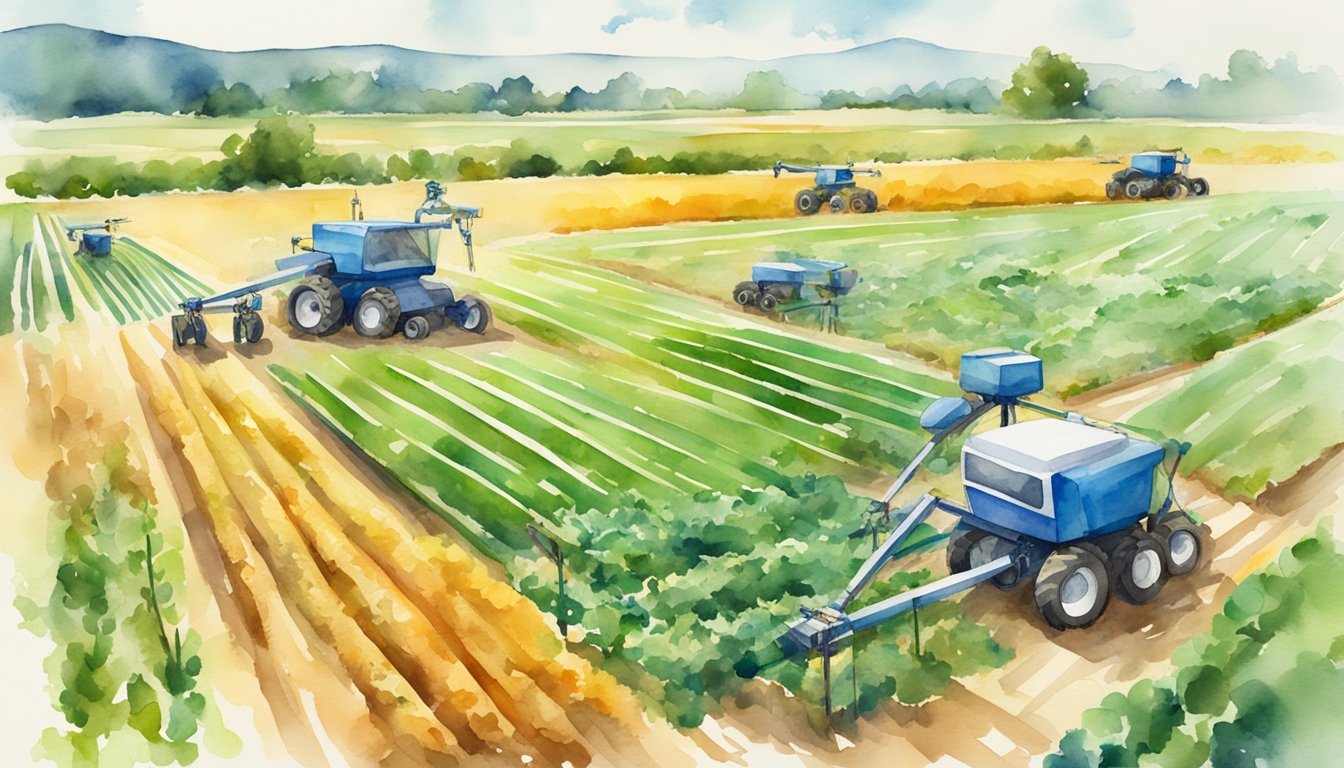Revolutionizing Agriculture with AI
As the global population climbs, the agriculture sector turns to AI to meet the growing food demand efficiently. This integration of technology is vital for enhancing crop yield, reducing waste, and enabling farmers to navigate the complexities of modern farming.
Emergence of AI in Farming
Artificial intelligence’s entry into agriculture has been a game-changer. Platforms leveraging AI tools are providing actionable insights to farmers by processing large volumes of data, garnered from various sources. This data-driven approach has resulted in more informed decision-making. Robots and drones equipped with sensors and machine learning capabilities can now monitor crop health, soil quality, and environmental conditions, leading to the birth of precision agriculture.
Farmers are utilizing these AI-driven technologies to optimize every aspect of farming, from sowing to harvesting. Drones map fields and monitor crop health from above, capturing data that once would have taken days to collect through manual labor. Similarly, on the ground, robots perform tasks ranging from planting seeds to weeding, tracked and managed by farmers’ smart devices.
AI-Powered Solutions for Crop Management
In crop management, AI is most visible through precise weather forecasting and pest control. Here, machine learning models ingest vast datasets to predict weather patterns, ensuring optimal planting times and mitigating risks associated with harsh conditions. Those same models are revolutionizing pest management by pinpointing infestations and determining safe, targeted applications of pest control measures, thus preserving the ecosystem.
Computer vision technology in drones and robots captures high-resolution images to monitor crop growth at a granular level, a process that greatly enhances yield. The technology enables the identification of diseased or undernourished plants, allowing farmers to react swiftly to protect their fields. Automation is not only preserving crops but also ensuring consistent food production.
Artificial intelligence in agriculture extends to the business side as well, with AI-powered market analysis tools helping farmers to understand trends and make better selling decisions. The AI in Agriculture Market is poised to expand as these technologies become more accessible and tailor-fitted to different agricultural needs, marking a new era of efficiency and sustainability.
AI-Driven Technologies and Their Impact

Advances in artificial intelligence are revolutionizing the agriculture sector by enhancing resource optimization and sustainability, which are crucial to addressing global food security challenges.
Optimizing Resources with AI
Agricultural AI technologies improve the usage of resources such as soil, water, and energy. Farmers utilize intelligent crop planning with AI, tailoring their strategies based on predictive analytics to achieve higher crop yields. Smart sensors in the field monitor soil moisture and nutrient levels, adjusting irrigation and fertilizer use with precision, thus conserving water and reducing fertilizer runoff.
- Water Management: AI helps with the accurate application of irrigation to reduce water usage.
- Energy Efficiency: AI algorithms optimize machinery use, decreasing the farm’s carbon footprint.
- Nutrient Management: Sensors provide data on soil conditions, enabling precise fertilizer application to avoid excess.
Enhancing Sustainability and Food Security
AI-driven technologies are key to sustainable farming practices that mitigate the impact of climate change and ensure food security. Sustainable AI-based production is pivotal in smart farming, as it not only minimizes the use of chemicals through better detection of pests, weeds, and diseases but also improves the overall health of crops.
- Climate Change Adaptation: AI models predict weather patterns, aiding in crop planning and resilience.
- Pest and Weed Control: Machine learning helps in identifying and managing pests and weeds, reducing the need for herbicides.
- Food Security: AI enhances crop yields and quality, ensuring stable food production in the face of a growing population.
By embracing AI technologies, the agricultural sector is becoming more efficient and sustainable, which is essential for feeding the world’s population responsibly.

